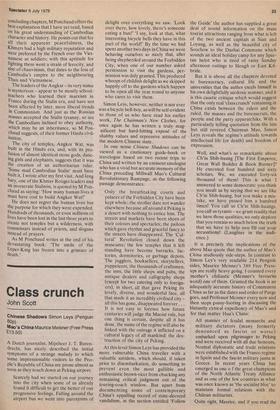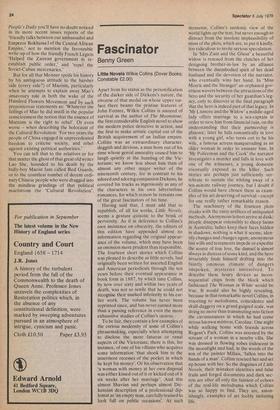Class crunch
John Scott
Chinese Shadows Simon Leys (Penguin 80P)
Mao's China Maurice Meisner (Free Press £13.50) A Dutch journalist, Mijnheer J. T. Barendrecht, has nicely described the initial symptoms of a strange malady to which some impressionable visitors to the People's Republic of China are prone almost as soon as they touch down at Peking airport.
Scarcely had we started on our journey into the city when some of us already found it difficult to get the better of our progressive feelings. Falling around the airport bus we went into paroxysms of delight over everything we saw. 'Look over there, how lovely, there's someone eating a bun!' I say, look at that, what interesting bicycle bells they have in this part of the world!' By the time we had spent another two days in China we were behaving ourselves so nicely that, after being shepherded around the Forbidden City, when one of our number asked permission to visit the gardens, permission was duly granted. This produced whoops of childish delight as we skipped happily off to the gardens which happen to be open all the year round to anyone who cares to visit them.
Simon Leys, however, neither is nor ever was a bicycle bell-boy, as will be self-evident to those of us who have read his earlier work, The Chairman's New Clothes, for once again he has written a truly magnificent but hard-hitting exposé of the shabby values and repressive attitudes of the modern Chinese state.
In one sense Chinese Shadows can be viewed as a cautionary guide-book or travelogue based on two recent trips to China and written by an eminent sinologist who has a vivid but accurate memory of the China preceding Millwall Mao's Cultural Revolutionary Rampage, as the following passage demonstrates:
Only the breathtaking courts and palaces of the Forbidden City have been kept whole; the stroller dare not wander elsewhere because all around it Peking is a desert with nothing to entice him. The streets and markets have been shorn of their colours and spectacles; the pailous which gave rhythm and graceful fancy to the streets have disappeared. The 'Cultural' Revolution closed down the museums; the few temples that it left standing have become barracks, factories, dormitories, or garbage depots. The jugglers, booksellers, storytellers, puppeteers, the thousands of craftsmen, the inns, the little shops and pubs, the antique dealers and calligraphy shops (except for two catering only to foreigners), in short, all that gave Peking its lovely, diverse, and wonderful face, all that made it an incredibly civilised city — all this has gone, disappeared forever. . . It is not easy to foresee how future centuries will judge the Maoist rule, but one thing is certain, despite all it has done, the name of the regime will also be linked with the outrage it inflicted on a cultural legacy of all mankind: the destruction of the city of Peking.
At this level Simon Leys has provided the more vulnerable China traveller with a valuable antidote, which should, if taken prior to disembarkation, do something to prevent even the most gullible and enthusiastic brown-ricer from chucking any remaining critical judgment out of the touring-coach window. But apart from documenting some of contemporary China's appalling record of state-decreed vandalism, in the section entitled 'Follow the Guide' the author has supplied a great deal of sound information on the main tourist attractions ranging from what is left of the two ancient capitals at Sian and Loyang, as well as the beautiful city of Soochow to the Dazhai Commune which sounds an ideal holiday camp for any Spartan helot who is tired of rainy Sunday afternoon outings to Slough or East Kilbride.
But it is above all the chapters devoted to bureaucracy, cultural life and the universities that the author excels himself M his own delightfully sardonic manner, and it is this caustic critique which would suggest that the only real 'class crunch' remaining in China exists between the rulers and the ruled, the masses and the bureaucrats, the people and the party apparatchiks. With a particularly telling quotation from the late but still revered Chairman Mao, Simon Leys reveals the regime's attitude towards intellectual life (or death) and freedom of expression.
Well, and what's so remarkable about Ch'in Shili-huang [The First Emperor, Great Wall Builder & Book Burner'? He executed four hundred and sixty scholars. We, we executed forty-six thousand of them! This is what I answered to some democrats: you think you insult us by saying that we are like Ch'in Shih-huang, but you make a mistake, we have passed him a hundred times! You call us Ch'in Shih-huangs, you call us tyrants— we grant readily that we have those qualities; we only deplore that you remain so much below the truth that we have to help you fill out your accusations! (Laughter in the audience.)
It is precisely the implications of the above Mao quote that the author of Mao's China studiously side-steps. In contrast to Simon Ley's very readable 214 Penguin sides, Maurice Meisner's 389 Free Pressups are really heavy going. I counted every mother's chiliastic (Meisner's favourite word) one of them. Granted the book is an adequately accurate history of Communist China as far as the dates and order of Purge goes, and Professor Meisner every now and then stops pussy-footing in discussing the blatantly cynical expediency of Mao's and for that matter Hua's China:
All manner of feudal monarchs and military dictators (many formerly denounced as fascist or worse) embarked upon pilgrimages to Peking and were received with all due honours. Normal diplomatic and trade relations were established with the Franco regime in Spain and the fascist military junta in Greece. In recent years China has emerged as one o f the great champions of the North Atlantic Treaty Alliance and as one of the few countries in what was once known as 'the socialist bloc' to maintain formal relations with the Chilean militarists.
People's Daily you'll have no doubt noticed in its more recent issues reports of the 'friendly talks between our ambassador and Emperor Bokhassa I of the Central African Empire,'. not to mention the favourable write-up of how the friendly French Legion 'Helped the Zairean government to reestablish public order,' and 'repel the Soviet-Cuban mercenaries.'
But for all that Meisner spoils his history by his ambiguous attitude to the harsher side (every side?) of Maoism, particularly when he attempts to explain away Mao's unsavoury role in both the wake of the Hundred Flowers Movement and by such preposterous statements as: 'Whatever the failings of Mao he did instill in the popular consciousness the notion that the essence of Marxism is the right to rebel'. Or even worse — when describing the holocaust of the Cultural Revolution: 'For two years the people of China engaged in unprecedented freedom to criticise society, and rebel against existing political authorities.'
You can tell that to the relatives or for that matter the ghost of that great old writer Lao She, hounded to his death by the bully-boy Maoist fans called Red Guards, or to the countless number of decent ordinary Chinese people who were dragged into the mindless grindings of that political maelstrom the 'Cultural Revolution'.



































 Previous page
Previous page